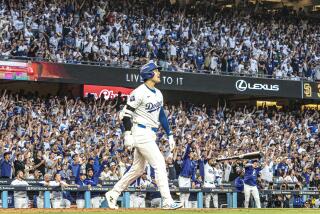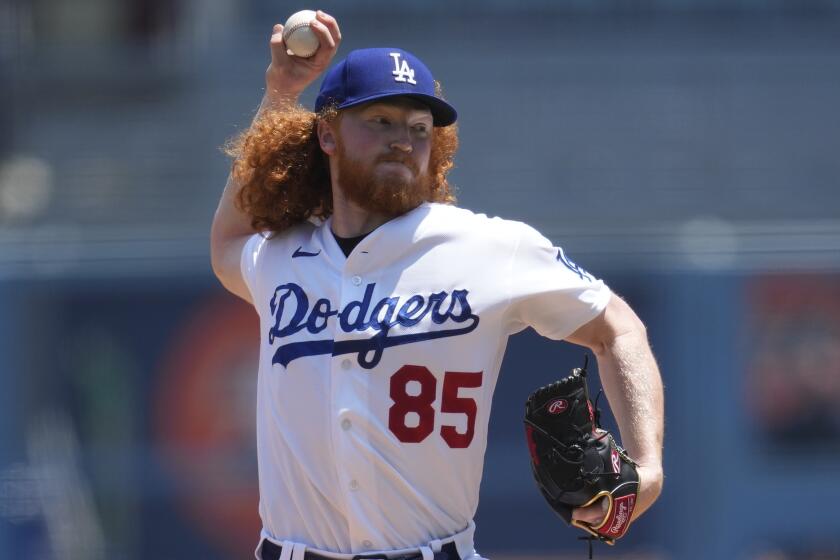High school wasn’t his time
CINCINNATI — Clayton Kershaw was the national player of the year as a high school senior in Texas. Andre Ethier was an all-state player in Arizona. Rod Barajas was an all-league catcher in Southern California.
Hiroki Kuroda was none of that ... and less.
Kuroda, who will start the Dodgers’ series opener in Cincinnati on Friday, spent almost his entire high school career on the bench.
This wasn’t one of those cases in which a coach played his son or nephew over a more talented player. “He was the third-best pitcher on the team,” said Hidemasa Tanaka, who coached Kuroda at Uenomiya High in Japan’s Osaka prefecture.
Tanaka was at Dodger Stadium when Kuroda shut out the Milwaukee Brewers over 72/3 innings on May 17 in a 3-0 victory for the Dodgers.
“I never imagined he would be able to pitch here,” Tanaka said.
Kuroda, 36, said his experience in high school is what drove him to become one of the most decorated Japanese pitchers of his era. “I wanted to prove him wrong,” he said of Tanaka.
Tanaka, who now coaches at a different high school in Osaka, smiled as he recalled how he had high expectations for Kuroda when he heard he would attend his school. Kuroda’s father, Kazuhiro, was a professional player.
But Tanaka soon realized that Kuroda didn’t measure up to his father.
“Pro scouts frequently came to watch our teams play,” Tanaka said. “But no one bothered with Kuroda. There was no point.”
Kuroda was tall and threw hard. He had discipline. But he had one major problem: control.
When Dodgers reliever Hong-Chih Kuo was placed on the disabled list with an anxiety disorder that was blamed for his past command issues, Kuroda said he faced a similar obstacle in high school.
When Kuroda threw bullpen sessions, Tanaka instructed the catcher to not catch anything that wasn’t a strike.
“If I threw a ball, the catcher would let it go by him,” Kuroda said. “I would have to run to retrieve the ball, then run back to the mound to make the next pitch.”
Tanaka said that Kuroda never complained, even though he rarely pitched in an official game.
The official season consisted of three single-elimination tournaments -- in the spring, summer and fall. Because the stakes were high, only the top players got into games.
“I wanted to quit many times,” Kuroda said.
Tanaka’s only recollection of Kuroda pitching in official games was during his second year of high school, when he pitched in relief a few times in the fall tournament.
But Kuroda was used plenty in practice games. “He pitched more than anyone else,” Tanaka said. “I think he pitched at least 1,000 innings in high school. Our top two pitchers weren’t that durable. But he was, so I made him throw a lot.”
Kuroda said that he considered giving up baseball when he graduated from high school but felt like he “hadn’t done everything” he could.
He tried out for the baseball team at Senshu University in Tokyo and was granted admission to the school when he impressed the coach with his velocity.
Over the next few years, his control gradually improved. By the end of his college career, the Hiroshima Carp thought he was worth a second-round draft pick.
Kuroda pitched 11 seasons in Japan. This is his fourth season in the major leagues. But until last month, Tanaka had never seen him pitch a professional game in person.
“I thought his career could be near the end and that I should go while I still had the chance,” Tanaka said.
Tanaka said he was moved by seeing Kuroda end a three-game losing streak for the Dodgers. He said Kuroda’s success was a testament to his character.
“Of course, physical talent and skill matters,” Tanaka said. “But I think the human element counts a lot.”
Kuroda said he hopes his story can inspire late-developing players. “Right now, I’m sure there are many kids out there who want to quit,” he said. “High school was really tough for me, but I think those bad times were beneficial to me. No matter what happens, I know I can deal with it.”
--
(BEGIN TEXT OF INFOBOX)
Mr. Consistent
Hiroki Kuroda’s numbers with the Dodgers:
*--* Year W-L IP BB-SO ERA 2008 9-10 183.1 42-116 3.73 2009 8-7 117.1 24-87 3.76 2010 11-13 196.1 48-159 3.39 2011 5-5 72.0 18-53 3.50 *--*
More to Read
Are you a true-blue fan?
Get our Dodgers Dugout newsletter for insights, news and much more.
You may occasionally receive promotional content from the Los Angeles Times.








